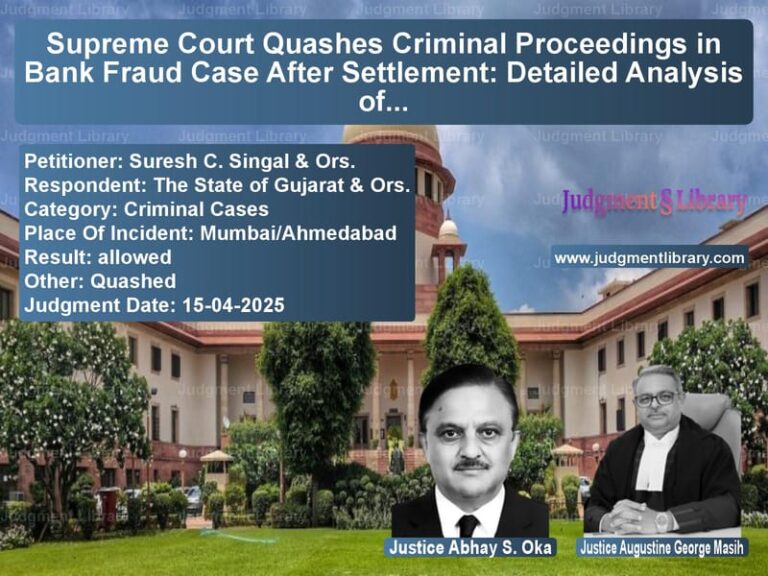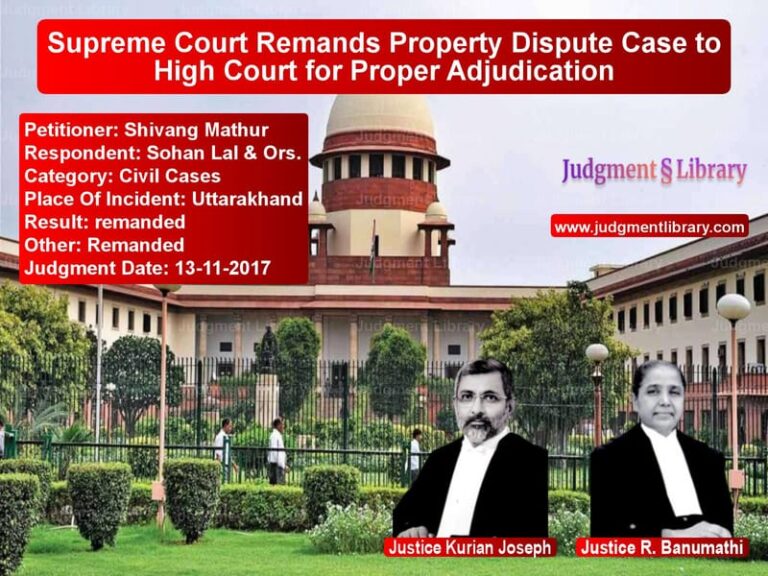Supreme Court Acquits Accused in Rajasthan Murder Case Due to Unreliable Eyewitness Testimony
The case of Radhey Shyam & Ors. vs. State of Rajasthan was a criminal appeal before the Supreme Court, arising from a long-standing legal battle involving allegations of political rivalry, unreliable eyewitness testimonies, and procedural lapses. The appellants were convicted under Sections 148 and 302 read with Section 149 of the Indian Penal Code (IPC) for their alleged involvement in the murder of Raghunath Singh. The trial court had convicted eight accused, while twenty-one others were acquitted. The Rajasthan High Court upheld the convictions. However, the Supreme Court overturned the decision, citing serious doubts about the reliability of eyewitness testimony and procedural fairness.
Background of the Case
The incident occurred on April 16, 1976, in Rajasthan. The prosecution alleged that a group of Ahirs, belonging to the Azad Party, attacked Raghunath Singh due to political rivalry. The FIR was lodged by Shiv Raj Singh (PW-6), the brother of the deceased, who claimed that a politically motivated mob killed Raghunath Singh. The prosecution heavily relied on the testimonies of two eyewitnesses: Krishna (PW-3), the minor daughter of the deceased, and Kanwarbai (PW-4), the mother of the deceased.
Trial Court’s Judgment
The trial court convicted eight accused based on the testimonies of PW-3 and PW-4. The remaining 21 accused were acquitted due to lack of evidence. The trial court found that PW-3 had seen the accused attacking her father and that PW-4 had also witnessed part of the incident. The accused were sentenced to life imprisonment.
Read also: https://judgmentlibrary.com/supreme-court-overturns-high-court-decision-on-nia-bail-cancellation/
High Court’s Judgment
The Rajasthan High Court upheld the conviction, ruling that the testimonies of PW-3 and PW-4 were credible. It dismissed the arguments that PW-3 was a tutored witness and that PW-4’s failure to identify the accused in court was a fatal flaw. The High Court also held that the delay in sending the FIR did not materially affect the case.
Arguments by the Petitioner (Appellants)
The appellants, who were among the convicted accused, challenged the High Court’s ruling in the Supreme Court. They contended that their conviction was based on unreliable evidence, and the prosecution failed to prove their guilt beyond a reasonable doubt.
- “PW-3 was a minor witness whose testimony was inconsistent and possibly tutored.”
- “PW-4 failed to identify any of the accused in court, making her testimony unreliable.”
- “The FIR was delayed by three days, which raises serious doubts about the credibility of the prosecution’s case.”
- “There was a political rivalry between the deceased’s family and the accused, increasing the likelihood of false implication.”
- “The alleged recovery of weapons at the instance of the accused is insufficient to convict without independent corroboration.”
Arguments by the Respondent (State of Rajasthan)
The prosecution defended the High Court’s judgment and argued that the convictions were valid.
- “PW-3 was a credible witness despite being a minor, and her testimony should not be disregarded merely due to her age.”
- “The delay in sending the FIR was justified and does not impact the credibility of the case.”
- “PW-4 named several accused, and even if she could not identify them in court, her testimony still supports the prosecution’s case.”
- “The High Court correctly upheld the conviction based on the weight of the evidence.”
Supreme Court’s Analysis and Judgment
The Supreme Court carefully examined the evidence presented and found significant deficiencies in the prosecution’s case. The Court ruled that the testimonies of PW-3 and PW-4 were not reliable enough to sustain a conviction.
- “PW-3 identified five accused, but the court found serious inconsistencies in her identification.”
- “The procedure used for identifying the accused in court was flawed. The accused were removed from the dock and presented separately for identification, making the process unfair and unreliable.”
- “PW-4 completely failed to identify any accused in court, further weakening the prosecution’s case.”
- “The delay in sending the FIR to the magistrate remained unexplained, raising doubts about the authenticity of the prosecution’s narrative.”
- “The conviction cannot rest solely on the recovery of weapons at the instance of the accused without corroborative evidence.”
The Supreme Court concluded:
“We are, therefore, of the considered opinion that the identity of the named accused as assailants of the deceased has not been established in the Court beyond a reasonable doubt.”
Key Takeaways from the Judgment
- Unreliable eyewitness testimony can lead to an acquittal, especially if the identification of the accused is flawed.
- Delays in filing FIRs can cast suspicion on the prosecution’s case, especially when no reasonable explanation is provided.
- Conviction cannot be based solely on the recovery of weapons; there must be substantial corroborative evidence.
- Political rivalry can be a factor in false implication, necessitating strict judicial scrutiny.
- The procedure for identification of accused persons must be fair and conducted in a manner that ensures credibility.
Impact of the Judgment
This ruling has a significant impact on the interpretation of circumstantial evidence and eyewitness testimony in criminal trials. It reinforces the principle that courts must critically evaluate evidence and ensure that convictions are based on unimpeachable testimony and a strong chain of evidence. It also highlights the responsibility of the police and lower courts in ensuring procedural fairness and avoiding wrongful convictions.
By setting aside the conviction, the Supreme Court reaffirmed the principle that mere suspicion is not sufficient to convict an individual; proof beyond a reasonable doubt is required. This case serves as an important precedent for future cases where eyewitness testimony forms the primary basis of conviction.
Petitioner Name: Radhey Shyam & Ors..Respondent Name: State of Rajasthan.Judgment By: Justice Abhay S. Oka, Justice Rajesh Bindal.Place Of Incident: Rajasthan.Judgment Date: 12-04-2023.
Don’t miss out on the full details! Download the complete judgment in PDF format below and gain valuable insights instantly!
Download Judgment: radhey-shyam-&-ors.-vs-state-of-rajasthan-supreme-court-of-india-judgment-dated-12-04-2023.pdf
Directly Download Judgment: Directly download this Judgment
See all petitions in Murder Cases
See all petitions in Bail and Anticipatory Bail
See all petitions in Attempt to Murder Cases
See all petitions in Fraud and Forgery
See all petitions in Custodial Deaths and Police Misconduct
See all petitions in Judgment by Abhay S. Oka
See all petitions in Judgment by Rajesh Bindal
See all petitions in allowed
See all petitions in Quashed
See all petitions in supreme court of India judgments April 2023
See all petitions in 2023 judgments
See all posts in Criminal Cases Category
See all allowed petitions in Criminal Cases Category
See all Dismissed petitions in Criminal Cases Category
See all partially allowed petitions in Criminal Cases Category







